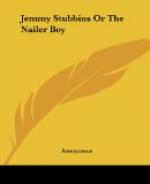But, continued the blacksmith, speaking cheerily, I am not the one that ought to complain. Many is the man that has a harder lot of it than I, among the nailers along this hill and in the valley. My neighbor in the next door could tell you something about labor you never have heard the like of in your country. He is an older man than I, and there are seven of them in his family; and, for all that, he has no boy like Jemmy here to help him. Some of his little girls are sickly, and their mother is not over strong, and it all comes on him. He is an oldish man, as I was saying, yet he not only works eighteen hours every day at his forge, but every Friday in the year he works all night long, and never lays off his clothes till late of Saturday night. A good neighbor is John Stubbins, and the only man just in our neighborhood who can read the newspaper. It is not often he gets a newspaper; for it is not the like of us that can have newspapers and bread too at the same time in our houses. But now and then he begs an old one, partly torn, at the baker’s, and reads it to us of a Sunday night. So once in two or three weeks, we hear something of what is going on in the world—something about Corn Laws, and the Duke of Wellington, and Oregon, and India, and Ireland, and other parts of England. We heard tell a while ago that the poor people would not have to make so many nails for a loaf of bread much longer, because Sir Robert Peel and some other men were going to take off the port-locks and other taxes, and let us buy bread of them that could sell it the cheapest. When we heard this talked of, without knowing the truth of it, John Stubbins took a penny and went to the White Hart and bought a drink of beer, and then the landlady let him look into the newspaper which she keeps for her customers. When he came back, he told us a good deal of what was going on, and said he was sure the times would be better one of these days.
Here he was interrupted by John Stubbins himself, who, hearing some strange voices mingling in earnest conversation in the other end of the building, came round to see who was there. With the entrance of this John Stubbins, I must turn over another leaf of my journal.
* * * * *
SECOND VISIT TO THE LITTLE NAILER.
The interest created in the United States by the above account of my first meeting with Josiah, encouraged me to propose that the children of America should, by a subscription of a half dime each, contribute as much money as would clothe and educate him for a year. The proposition met with a cordial response, and one hundred dollars were soon collected for this purpose.




